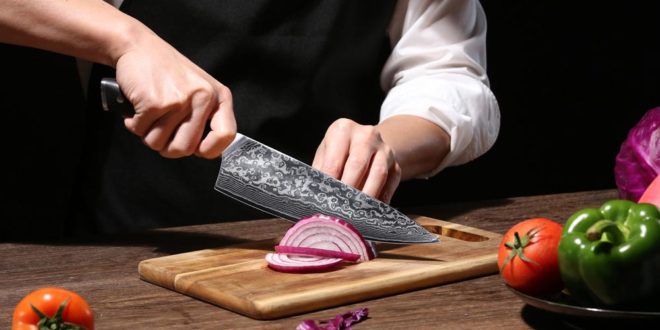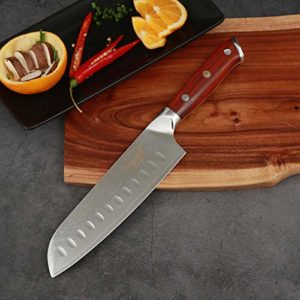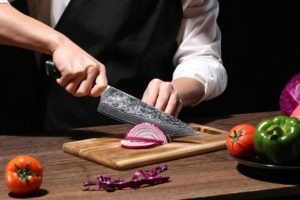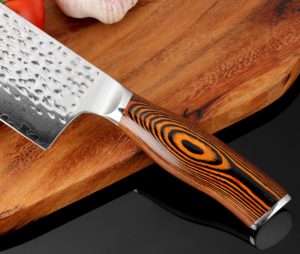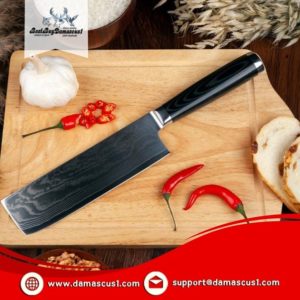Damascus Steel knives – Best Tool For Cutting
Thank you for purchasing this Damascus Steel kitchen knife! Damascus1.com will offer you an exceptional cutting pleasure. The knife has been part of Japan’s culture for thousands of years and this country is unparalleled in forging quality kitchen knives. These knives however require a little more love and attention than other knives. By taking good care of your knife, it will serve you better.
Properties of the kitchen knife
A Damascus steel kitchen knife is characterized by a blade with a high hardness. This makes it possible to sharpen the blade very finely to obtain an excellent cutting power and an extreme sharpness. Often a non-stainless carbon steel is used. In many cases this results in even sharper sharpening than with stainless steel. These properties make Damascus Steel kitchen knives unique.
Points of attention
The use of these special Damascus Steel kitchen knives, however, requires some attention. Due to the high hardness and very fine sharpening of the blade, improper use may cause damage. It is important to pay attention to the following points:
Correct use
- Use the knife that suits the task you want to perform. For example a cleaver for chopping, a boning knife for boning or a slicing knife for cutting meat.
- Do not make any lateral movement with the knife. You must also refrain from detaching a piece with a scissors motion, rocking or chopping when using a Damascus Steel kitchen knife. Otherwise you are sure to damage the cutting edge. This knife is simply not designed to be used in this way. Be careful to only move up and down with the knife.
- Beware of bones, bones, frozen foods and hard cores. The blade is not suitable for these hard elements, a chopper or a boning knife will do better. These hard elements may not only dull your knife, but also chipping the edge. A phenomenon called chipping in English. It would be a shame if such a beautiful knife was chipped!
- If you put a lot of force into cutting, you risk damaging the knife. A Damascus Steel kitchen knife is so fine and sharp that it slides smoothly through almost any material. If you have to use a lot of force to cut, you may want to do too much. Check the food and possibly use another knife. By suddenly piercing the food, you risk hitting the board hard with the consequences that unfold … not only for the knife, but also for your own safety.
- Always use a plastic board or, better still, a wooden board. The marble and the glass may be easy to wash, they are so hard they mistreat the edge. In general, it can be said that when the knife does not line the board, it is too hard for the edge. Never use a marble or glass board.
Cleaning
- Wash the knife immediately after using it. Knives with a carbon steel core (Blue Paper Aogami, for example) are very susceptible to rust. Do not wait until the end of the meal, but wash the knife right after use. Do not forget to dry it!
- Always wash your Damascus Steel kitchen knife by hand. A knife is certainly water resistant, but the aggressive substances contained in the tablets for dishwashers irreparably damage the knife. To avoid, therefore.
Arrangement
- Store your knife safely. Leaving the knife dragging in the bottom of a drawer, it may touch other steel objects. The edge will suffer. For your safety, it is also best not to rummage in a drawer where there is a sharp kitchen knife … Use protections for knife or, even better, a good magnet or a knife block.
Inform the rest of the household
- Inform the rest of the household of the precautions to take with your knives. Even if you know how to handle your knife, this is not necessarily the case for other family members who may be less familiar with the care they require. Explain that they should be careful and that the knife should be washed after use. Warn them also that the knife is sharp, it will save you a passage to the emergency room.
Maintenance of your Kitchen knife
You wash your knife in time, use it thoughtfully and store it safely. So we can assume that you know what you are doing. Let’s talk about the interview now. Just like a car, it is necessary from time to time to maintain a damascus steel knife. And it’s less complicated than you might think.
Sharpening
Even if you cut carefully, there will come a time when the knife will have to be sharpened. A dull knife automatically forces you to exert more force, which increases the risk of accidents. It is better to keep his knives sharp. It also helps to cut better literally and figuratively. As for sharpening, it is advisable not to wait until the last moment. It is indeed easier to keep sharp a reasonably sharp knife than to restore the sharpness of a dull knife. You will find information on sharpening knives on our website. It’s a job that you can easily do yourself. But if you do not dare to do it, nothing prevents you from using a professional sharpener.
For daily maintenance of the damascus steel knives, we advise you to use a ceramic rifle. A metal rifle often does not serve much purpose with this type of hard steel and does not remove material, while a rifle actually sharpens your knife.
Handle maintenance
When manufactured, a wooden handle is often treated with wax or oil. After using the knife for a few months, it is not superfluous to apply a little oil on the wooden handle. We advise you to use the oil for the maintenance of the wooden sleeves Robert Herder, Ballistol or another mineral oil. In the long term, olive oil can go rancid.
